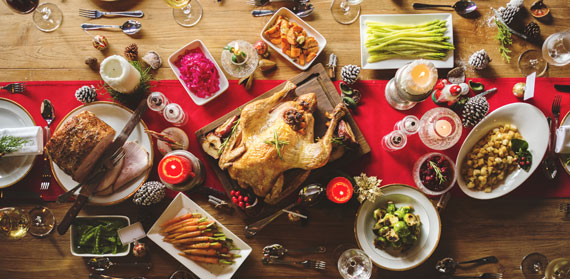Shutterstock
Guest post by Jordon Lazell, Centre for Business in Society
Its Christmas time and the problem of food waste rears its head once again. Households are continuing to throw away vast amounts of perfectly editable food and the festive season is a key culprit.
It is estimated that a staggering 74 million minced pies are thrown away each Christmas and 4.2 million plates of turkeys and trimmings are also going straight in the bin. This isn’t just a shocking waste of the time, money and effort put into growing, manufacturing, transport and cooking food that is ultimately wasted but this also has a detrimental impact on the environment given that food and drink accounts for 20% of the UK’s CO2 emissions.
So why are we wasting so much food over this period? There is no simple explanation. Many of the reasons stem from why food is wasted throughout the year. This includes over purchasing, improper food storage, poor planning and a lack of understanding of date labelling amongst other factors. However there are some reasons for food waste that maybe unique to Christmas.
Research has shown that much of what we waste relates to the habitual way in which we plan, shop and eat, meaning that the habits and routines of everyday life shape our food waste behaviours. Christmas is a time of interruption and disruption of routines making it a prime candidate for wasting food.
Picture the scene, your whole family are coming round for Christmas dinner. You want to impress and ensure everyone has their favourite foods and that there is plenty to go around. After a mammoth supermarket shop, planning and cooking a feast, the meal is a success and a Christmas to remember. But wait, did all the food get eaten? You were overzealous with the amount vegetables needed and a collection of sweet treats that weren’t quite to everyone’s liking remain. These leftovers haunt your fridge and hide in containers behind various sauces and alcoholic beverages over the next few days. But despite the best intentions, and due to eating out more often than usual, the food gets thrown away.
There is a lack of research on why food is wasted at seasonal periods like Christmas. Catering for others is often interpreted as ensuring there is more than enough to go around and it’s much more difficult to keep track of food’s degradation in a fuller fridge. Normal practices of planning out meals and cooking to portion sizes during a typical working week go out the window given the change to schedules that revolve around relaxing and unwinding. Don’t despair however, are many things you can do to prevent food waste this Christmas.
Firstly planning. At Christmas this becomes even more important to ensure that food is bought, stored and used at the right time. There is a variety of time saving advice for being organised and taking the stress out of preparing food for the big day. Two out of five people worry about under or over cooking their turkey and planning ahead can help prevent this.
Secondly, taking control and managing the Christmas shopping is absolutely vital to ensure all the essentials are covered but at the same time you don’t go over board and shop like you are catering for 50. Being a savvy shopper means always taking a list and being wise about deals and promotions especially since food waste has been linked to shopping behaviours.
Thirdly, staying calm and remembering that you are cooking for your family not professional chefs. Food waste due to over compensating and wanting to provide and impress has been documented. Cooking should be an enjoyable part of Christmas.
Finally, redistribute and use up leftovers. Plan when the famous turkey curry will be cooked and make sure family and friends take home any excess food. Keep on top that extra food in the fridge, pay attention to use by dates, use your own judgement of how long items will last where necessary and use the freezer to prolong the life of food. Love Food Hate Waste provide advice on how to handle leftovers as well as plenty of innovative recipes and resources on how to best use up surplus Christmas food.




Comments are disabled